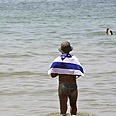
But Israelis are no longer that. Today, the defining experience of our youth, the worker-bees of culture, is the post-army voyage – enduring austerity in Dharamsala, making hard sales in the malls of Houston, or leading tours in Rome or Paris. And thus enlightened, or expanded, the young return home to study Susan Sontag, algorithms, or vertical marketing.
Israelis have become cosmopolitan – exactly the opposite of the stubbornly native sabra. But more than this, our society is endlessly varied. There are now Russian, Ethiopian, American, Druze, South American, British, French, and Arab Israelis (to name a few). The religious/non-religious dichotomy seems almost silly at a time when religious practice in Israel is a prism of belief and tradition. And while we speak Hebrew, we speak it with a dozen flavored accents and a thousand imported words.
So who are we? Forget the journalist groping for a cliché and ask the question: What we can say about ourselves? What makes us, us?
There’s a temptation to find a 2.0 equivalent to the sabra. I had thought of the ficus tree, which is a picture of variety, twisting and turning in search of new energy and nutrients. It’s an interesting metaphor because it’s a transplanted tree that thrives in Israel; because, ever the cosmopolitan, it doesn’t particularly care where it is, as long as it can gulp down more energy and continue to grow.
But is the Israeli personality today best represented by a tree? Should it not be a computer transistor? A desalination plant? The Iron Dome? Imported whiskey? Burger Ranch? Anything else?
There’s the real point: The Israeli personality has grown up. It can’t be stuffed into a squat little cactus any more than it can be shoved into a more complex metaphor. A little while ago Israeli culture was an expression of a relatively unified Israeli personality. Today, it’s the other way round: the wildly growing culture sends off new shoots of personality almost every day.
I still haven’t answered the question about what makes us, us. And I won’t answer it, because I don’t know the answer. What I can say is that we are not a flowering desert cactus – and I’m not sure we ever were. However, if we are going to find a true, human definition of ourselves and our society, we have to begin with the question – and there’s no better question-killer than a cliché.
So, with apologies to the American journalist in need of a convenient metaphor, let us declare: The sabra is dead. Long live the Israeli.
Ashley Rindsberg is a 29-year-old writer who’s contributed to The Daily Beast, The Huffington Post and Ynet, in addition to recently publishing a book of short fiction, Tel Aviv Stories .
- Follow Ynetnews on Facebook















